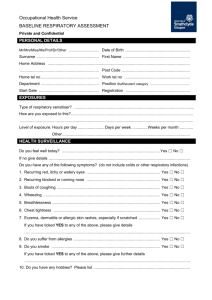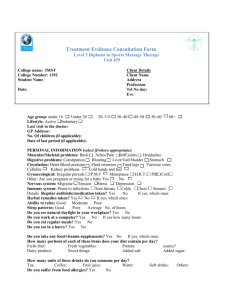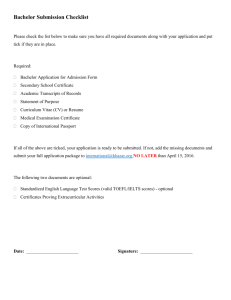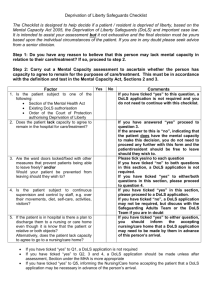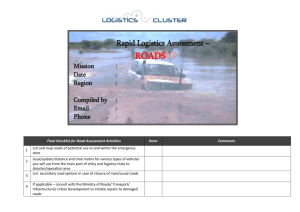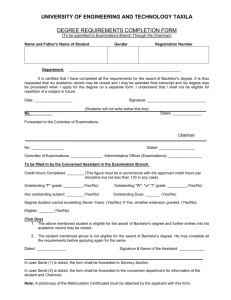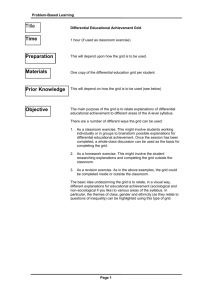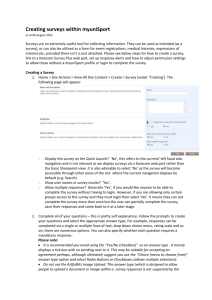file - BioMed Central
advertisement
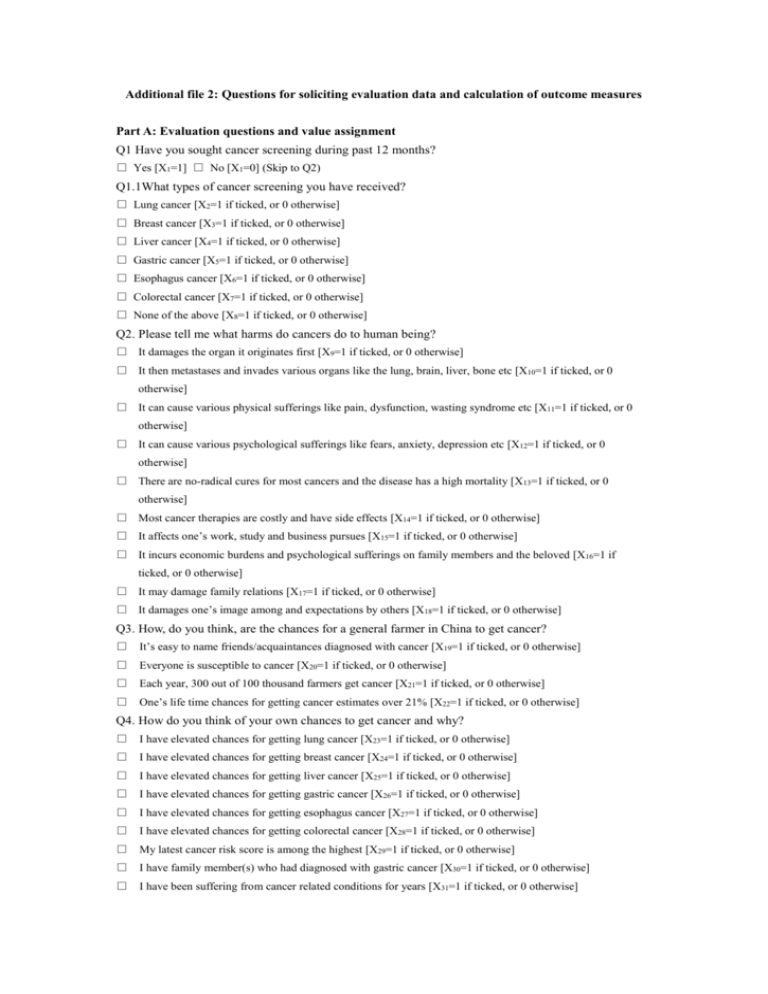
Additional file 2: Questions for soliciting evaluation data and calculation of outcome measures Part A: Evaluation questions and value assignment Q1 Have you sought cancer screening during past 12 months? □ Yes [X1=1] □ No [X1=0] (Skip to Q2) Q1.1What types of cancer screening you have received? □ Lung cancer [X2=1 if ticked, or 0 otherwise] □ Breast cancer [X3=1 if ticked, or 0 otherwise] □ Liver cancer [X4=1 if ticked, or 0 otherwise] □ Gastric cancer [X5=1 if ticked, or 0 otherwise] □ Esophagus cancer [X6=1 if ticked, or 0 otherwise] □ Colorectal cancer [X7=1 if ticked, or 0 otherwise] □ None of the above [X8=1 if ticked, or 0 otherwise] Q2. Please tell me what harms do cancers do to human being? □ It damages the organ it originates first [X9=1 if ticked, or 0 otherwise] □ It then metastases and invades various organs like the lung, brain, liver, bone etc [X10=1 if ticked, or 0 otherwise] □ It can cause various physical sufferings like pain, dysfunction, wasting syndrome etc [X11=1 if ticked, or 0 otherwise] □ It can cause various psychological sufferings like fears, anxiety, depression etc [X12=1 if ticked, or 0 otherwise] □ There are no-radical cures for most cancers and the disease has a high mortality [X13=1 if ticked, or 0 otherwise] □ Most cancer therapies are costly and have side effects [X14=1 if ticked, or 0 otherwise] □ It affects one’s work, study and business pursues [X15=1 if ticked, or 0 otherwise] □ It incurs economic burdens and psychological sufferings on family members and the beloved [X16=1 if ticked, or 0 otherwise] □ It may damage family relations [X17=1 if ticked, or 0 otherwise] □ It damages one’s image among and expectations by others [X18=1 if ticked, or 0 otherwise] Q3. How, do you think, are the chances for a general farmer in China to get cancer? □ It’s easy to name friends/acquaintances diagnosed with cancer [X19=1 if ticked, or 0 otherwise] □ Everyone is susceptible to cancer [X20=1 if ticked, or 0 otherwise] □ Each year, 300 out of 100 thousand farmers get cancer [X21=1 if ticked, or 0 otherwise] □ One’s life time chances for getting cancer estimates over 21% [X22=1 if ticked, or 0 otherwise] Q4. How do you think of your own chances to get cancer and why? □ I have elevated chances for getting lung cancer [X23=1 if ticked, or 0 otherwise] □ I have elevated chances for getting breast cancer [X24=1 if ticked, or 0 otherwise] □ I have elevated chances for getting liver cancer [X25=1 if ticked, or 0 otherwise] □ I have elevated chances for getting gastric cancer [X26=1 if ticked, or 0 otherwise] □ I have elevated chances for getting esophagus cancer [X27=1 if ticked, or 0 otherwise] □ I have elevated chances for getting colorectal cancer [X28=1 if ticked, or 0 otherwise] □ My latest cancer risk score is among the highest [X29=1 if ticked, or 0 otherwise] □ I have family member(s) who had diagnosed with gastric cancer [X30=1 if ticked, or 0 otherwise] □ I have been suffering from cancer related conditions for years [X31=1 if ticked, or 0 otherwise] □ I have unhealthy eating habits for years [X32=1 if ticked, or 0 otherwise] □ I have been a heavy alcohol drinker for years [X33=1 if ticked, or 0 otherwise] □ I have been smoking for years [X34=1 if ticked, or 0 otherwise] Q5. What, do you think, you can get from cancer screening? □ Cancer screening can detect and correct the pre-cancerous conditions and thus prevent cancers [X35=1 if ticked, or 0 otherwise] □ At early stages, cancer cells confine within limited boundary and can be radically cleared, e.g., by surgery [X36=1 if ticked, or 0 otherwise] □ At late stages, cancer cells metastases to other organs and becomes hard to be cleared from human body [X37=1 if ticked, or 0 otherwise] □ The earlier the detection of cancer, the better the outcomes of cancer treatment[X38=1 if ticked, or 0 otherwise] □ Regular screening not only detects early cancer but also communicates knowledge about cancer[X39=1 if ticked, or 0 otherwise] □ Cancer screening also helps in finding and correcting other health problems [X40=1 if ticked, or 0 otherwise] □ Even negative screening result frees you and your relatives from worries [X41=1 if ticked, or 0 otherwise] Q6. What problems or barriers you may encounter in seeking cancer screening? □ I feel it ominous seeking cancer screening [X42=1 if ticked, or 0 otherwise] □ I fear that cancer screening may damage my health [X43=1 if ticked, or 0 otherwise] □ I fear that cancer screening may cost me too much [X44=1 if ticked, or 0 otherwise] □ I don’t want to upset/scare my family by telling them that I need cancer screening [X45=1 if ticked, or 0 otherwise] □ I do not know where to get cancer screening [X46=1 if ticked, or 0 otherwise] □ I don’t know when to seek cancer screening [X47=1 if ticked, or 0 otherwise] □ I fear that cancer screening may take too long time and I have a tight time table [X48=1 if ticked, or 0 otherwise] □ I don’t know how to prepare for cancer screening [X49=1 if ticked, or 0 otherwise] □ It makes me and my family members worry too much if I were diagnosed with cancer [X50=1 if ticked, or 0 otherwise] □ I may be stigmatized if I were diagnosed with cancer [X51=1 if ticked, or 0 otherwise] Q7. If you need a cancer screening within one month, how confident that you will eventually realize it? □ 5- totally confident [X52=5 if ticked] □ 4 [X52=4 if ticked] □ 3 [X52=3 if ticked] □ 2 [X52=2 if ticked] □ 1-least confident [X52=1 if ticked] Part B: Calculation of outcome measures 1. Overall CS uptake rate =100%×∑ 𝑋1/n1. Here “n1” stands for total number of participants project evaluation. 2. Lung CS uptake rate =100%×∑ 𝑋2/n2. Here “n2” stands for total number of participants project evaluation eligible for lung cancer screening. 3. Breast CS uptake rate =100%×∑ 𝑋3/n3. Here “n3” stands for total number of participants project evaluation eligible for breast cancer screening. 4. Liver CS uptake rate =100%×∑ 𝑋4/n4. Here “n4” stands for total number of participants project evaluation eligible for liver cancer screening. in in in in 5. Gastric CS uptake rate =100%×∑ 𝑋5/n5. Here “n5” stands for total number of participants in project evaluation eligible for gastric cancer screening. 6. Esophagus CS uptake rate =100%×∑ 𝑋6 /n6. Here “n6” stands for total number of participants in project evaluation eligible for breast cancer screening. 7. Colorectal CS uptake rate =100%×∑ 𝑋7/n7. Here “n7” stands for total number of participants in project evaluation eligible for colorectal cancer screening. 34 8. Perceptions of susceptibility and seriousness=100%×∑ ∑34 𝑖=9 𝑋𝑖 /∑𝑖=9 𝑛𝑖 . Here ni stands for the number of the participants in the project evaluation who are eligible for providing information on the ith variable. 41 9. Perceptions of effectiveness and benefits =100%×∑ ∑41 𝑖=35 𝑋𝑖 /∑𝑖=35 𝑛𝑖 . Here ni stands for the number of the participants in the project evaluation who are eligible for providing information on the ith variable. 51 10. Perceptions of barriers and dis-benefits =100%×∑ ∑51 𝑖=42 𝑋𝑖 /∑𝑖=42 𝑛𝑖 . Here ni stands for the number of the participants in the project evaluation who are eligible for providing information on the ith variable. 11. Perceptions of ability and self-efficacy =100%×∑ 𝑋52 /5n52.Here n52 stands for the number of the participants in the project evaluation who are eligible for providing information on the 52th variable.
